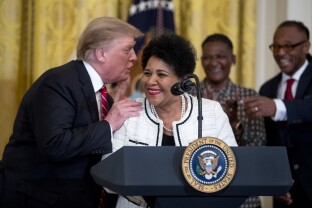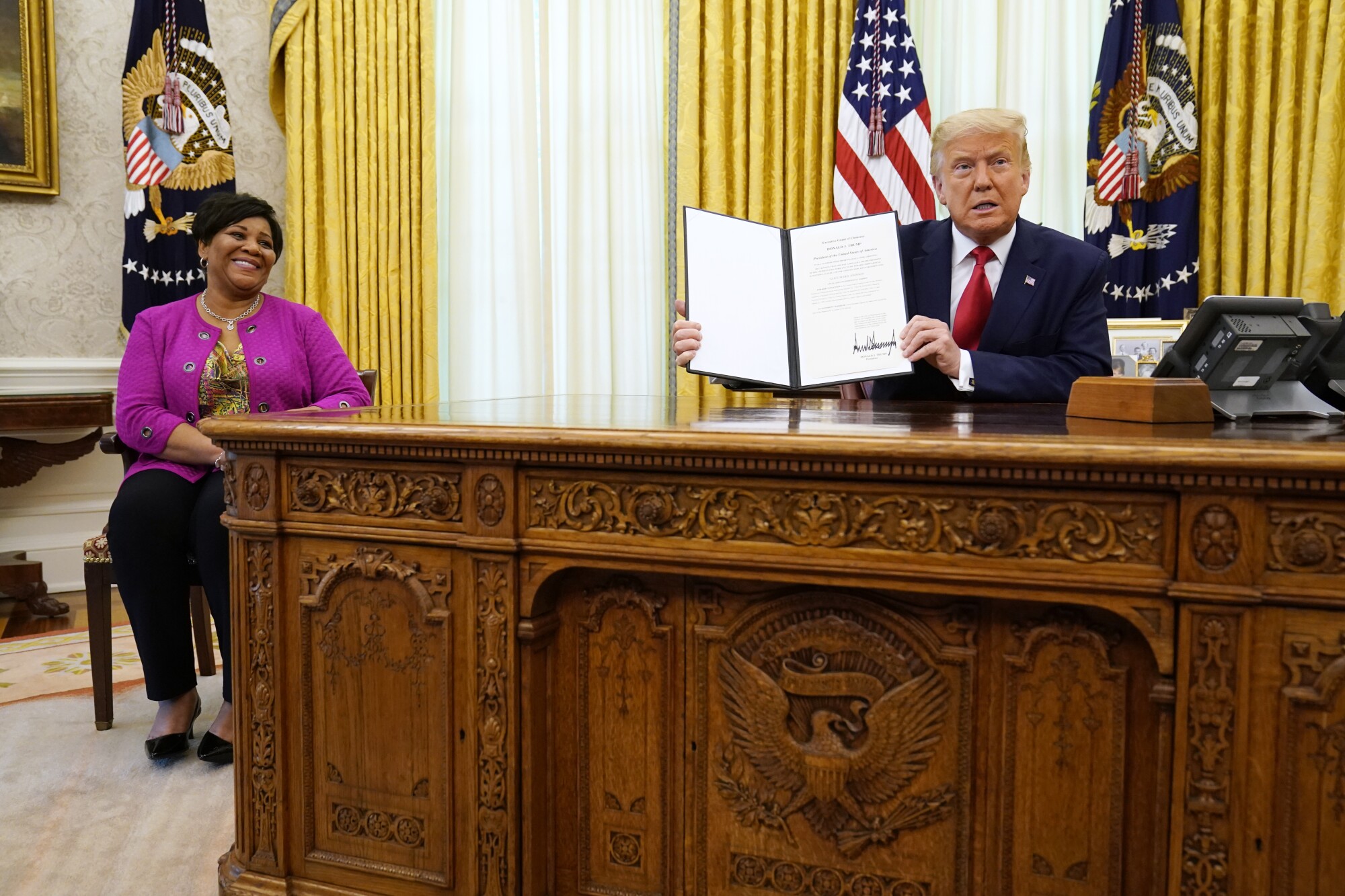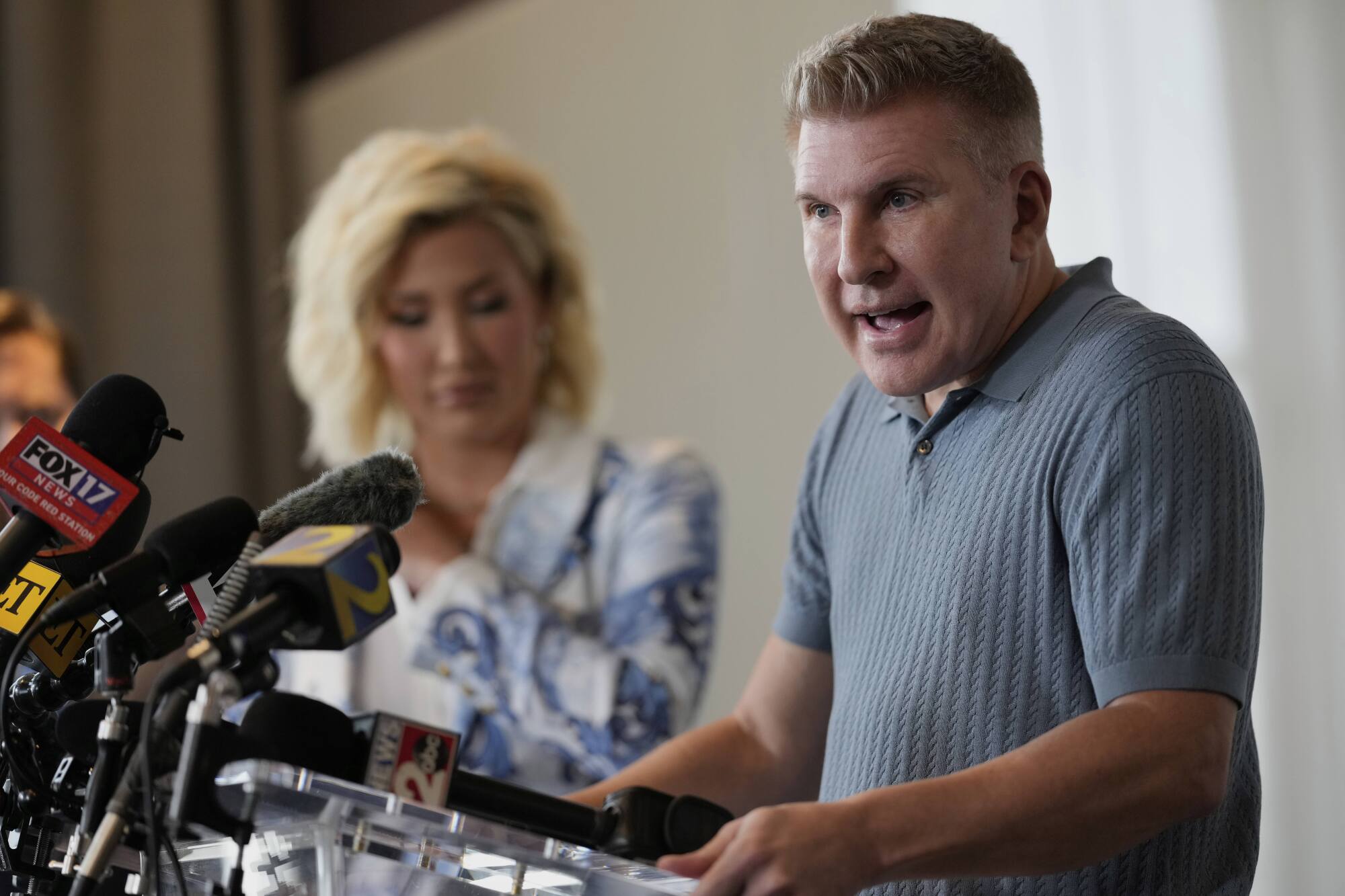Four days after receiving a pardon, reality TV star Todd Chrisley took the mic at Graceland to toast the woman who helped free him: Alice Marie Johnson. The 70th birthday party for President Donald Trump’s pardon czar was filled with friends, family members and a handful of people she had either helped release or who lobbied her on commutation cases, according to two people present.
Under Trump, the pardon economy has become personal.
For many, it’s all about getting your case in front of the right person and making the right connections, according to interviews with over a dozen lawyers, lobbyists, pardon recipients, Trump officials and friends of the president, who described a far more transactional operation than in the past that may lead to favoring those with means over those without. One source familiar with the process described it as a “‘what has that person done for me lately’ type of situation.”
There are a few routes to get a pardon. There’s Johnson, who sources said is the ultimate decider in whether cases should be elevated to the Resolute Desk and is considered a true believer in clemency for nonviolent offenders and cases that mirror her own.
“Of course, that’s a big part of it, but that is definitely not all of it. I look at, also, cases where there’s clear evidence of weaponization,” Johnson said in an interview with NOTUS. “Some of the white-collar crimes that they are really punishing people for has become the new drug crime in terms of draconian sentencing. So I look at everything holistically.”
There’s also newly appointed pardon attorney Ed Martin, who largely focuses on the weaponization of justice — a top Trump messaging topic.
Then there’s Trump himself.
Lawyers and lobbyists say they advise their clients to find a way to put themselves in front of Trump, including with trips to Mar-a-Lago to make their case in person, or to draw his attention through TV hits or opinion pieces in his favored outlets.
“The one key thing is that you just need to get in front of the president for a couple minutes,” said a source who represents people looking for pardons and requested anonymity to discuss the process. They said they tell their clients not to burden Trump with all the details.
The White House is now the epicenter of pardons, defanging the Department of Justice, which for decades oversaw the process almost exclusively and typically prioritized federal felons who showed signs of rehabilitation and growth while incarcerated. Just over 8,000 applications for clemency are currently pending in the Department of Justice’s system. In the White House, the process is carried out by less than 10 aides, who present the president with pardon suggestions about once a month, a White House official said.
After applications are vetted, Johnson,Trump’s chief of staff Susie Wiles and White House Counsel Dave Warrington make the final decisions on which applications are advanced to Trump, Johnson said. And that she and Warrington present the suggestions to the president in meetings.
“It has to be clearly laid out to him,” she told NOTUS. “I’ll take the lead, [Warrington] and myself on explaining the cases, really explaining every aspect.”
Now that the White House is at the core, the pardon process has become a quickly evolving and rapidly growing market for people to leverage their connections to the administration and the president himself in exchange for the promise of expedited applications. Every day, people close to the process say, there are new names of those who have gotten into the pardon business and new rumors of exorbitant fees being offered or requested.
The process is largely unregulated, as individuals only have to register and report their lobbying efforts if it takes up more than 20% of their time.
Fees can get as high as seven figures, with one person attesting to a deal that reached $5 million. Some people who help with pardon requests ask for an upfront fee to start their lobbying and another fee if the pardon is approved, although there’s no guarantee of the request making its way to Trump.
The White House denied that the process is a new phenomenon that favors those with means or who have relationships in the president’s orbit. “Lawyers making money isn’t breaking news,” a White House official said.
“You can’t put a price on giving people a second chance and those that are in charge of pardons won’t be swayed by rich lawyers,” the official added. “They’re really focused on the case itself.”
Johnson told NOTUS that multiple times over Trump’s first months in office, he has brought cases to her or the White House counsel that he would like them to look into for possible clemency. But it’s not just a phone call to the president that makes a pardon happen, the White House argues.
“He has the full authority to bring cases, but they still have to be vetted totally,” Johnson said, praising the president’s ability to identify potential victims. “There’s not a time that a case is not vetted.”
Trump’s children have directly advocated for pardons in the second term, according to people with knowledge of the process. Longtime Trump friends, like the formerly pardoned Roger Stone, can also call directly.
According to a source familiar with the outreach, Health and Human Services Secretary Robert F. Kennedy Jr. advocated to Trump for Trevor Milton, a major Republican donor who founded Nikola and was convicted of wire and securities fraud. Milton donated heavily to RFK Jr’s campaign and Make America Healthy Again political groups. He was pardoned in March.
One source close to the president pushed back on the claim that people are able to go up directly to Trump to discuss clemency, saying clemency operates mostly through the normal order. The source said they witnessed a person approach Trump to discuss a pardon, to which Trump responded, “Go talk to my legal team.”
But those who seek to appeal to Trump directly or through other channels say the same thing: To get a pardon, people must have a story that centers the president’s interests.
“We need to find the key in every case that resonates. And there almost always is,” said Peter Ticktin, Trump’s former lawyer who has advocated for pardons for January 6 rioters, the Oath Keepers and Proud Boys. And there are many cases he turns down.
Former Illinois Governor Rod Blagojevich, who received a commutation during Trump’s first term that released him from prison on corruption charges, told NOTUS that he was surprised when the president told him in a February phone call that he would be pardoning him days later.
“He said, ‘I’m gonna clean it all up for you. I’m gonna clean it all up for you,” the former Democratic governor recounted of their seven-minute call. Trump has followed along with Blagojevich’s case since before becoming president. “‘You’re gonna be cleaner than me.’”
Now an avid Trump supporter, Blagojevich said that he visited Mar-a-Lago a few weeks before the president’s second inauguration. Asked why Trump pardoned him without a request, the former governor said Trump called his prosecutors “sleazebags” in the same phone call. “He said, ‘You were set up by a lot of bad people,’” Blagojevich recalled.
Presidents often wait until the end of their term to issue clemency and pardons in large numbers, given the sometimes politically risky nature. (See President Joe Biden’s last-minute pardon of his son Hunter and other family members, which never went through the official pardon office, as one person familiar with clemency told NOTUS.)
This term, Trump jumped into pardons and clemency relatively quickly, something that his supporters say shows that he’s unbothered by the risks and better able to offer relief to those who deserve it.
“The goal is just to right as many wrongs as possible and give a second chance to deserving people,” the White House official said, saying there’s no number the administration is trying to reach. “It’s more so quality than quantity.”
But critics of the president’s actions say that much of the early pardon efforts were focused on people with means, including those convicted of crimes that would not typically be considered for a federal pardon. Meanwhile, they say, cases languish for people who have shown rehabilitation and served time.
“Those people are being overlooked in favor of people who are wealthy and well-connected and able to essentially purchase special access to the pardon process,” said Liz Oyer, a pardon attorney appointed by the Biden administration and then fired from the Trump administration two months into the new term.
She said that it was unlikely that Trump’s recent pardons were meeting guidelines set by the Justice Department.
“I believe that clemency has tremendous power to be used for good,” she said. “But that does not, by and large, appear to be what’s happening with the clemency process right now.”
A second White House official suggested that the guidelines that once dictated the pardon process were simply suggestions and “not tried and true,” acknowledging that they are not being followed strictly to determine who should receive clemency. But the official said there is still a process in place to deliver justice.
Johnson is at the helm. A well-known and well-respected criminal justice reform advocate, Johnson received a pardon from Trump in his first term after serving 21 years in prison, thanks in part to advocacy by Jared Kushner and Kim Kardashian.
Those who know Johnson describe her as a warm and caring figure who stays up late to read over pardon applications and checks in on people who have been recently freed to make sure they have the resources necessary to transition.
“Her goal is to help people come home and give people hope to stop going inside,” said former boxer Charles Duke Tanner, who was pardoned in May with the support of Johnson after receiving clemency in the president’s first term.
Johnson is also heavily involved in other prominent pardons for celebrities and Trump allies, including Todd and Julie Chrisley, according to two people with knowledge of the efforts. She became close to their daughter Savannah Chrisley, who framed her parents as targets of the Biden administration over their support for Trump after their conviction on tax and fraud charges.
For the most part, Johnson denied that those who receive clemency under her are a result of any personal relationship.
“That is not the thing that moves me,” she said of her relationship with the family or Trump’s relationships with someone seeking a pardon. She said that Chrisley’s pardon was under consideration before she became the official pardon czar, and the vast majority of pardons have gone to people with whom she shared no connection at all.
“There’s so much focus [on] the more famous people, they forget about the ordinary people … who received a second chance at life,” Johnson added.
Johnson personally pushed for reprieve for the infamous gang leader Larry Hoover, whose federal felonies were wiped away last month. His team had applied during Trump’s first term and Biden’s term, with no success until now.
“I think her being just as impacted clearly provides a different lens for how a lot of these applications are being analyzed and reviewed,” said Justin Moore, a lawyer on Hoover’s case.
“I can’t speak for Alice, but, you know, I would think that it probably did help that she was the person that, or one of the people, that reviewed the commutation application.”
Johnson also has ties to Black Hollywood. At her birthday party, which also celebrated the seven-year anniversary of her release from prison, celebrities like rapper Rick Ross and J. Prince, a well-respected record label executive, were in attendance, per Instagram photos.
The other major player in Trump’s pardon process is Martin, who was placed at the Justice Department after the president pulled his nomination for attorney general of D.C.
Martin is the first political appointee to be placed as the lead pardon attorney, creating a stark change in how the process was meant to remain apolitical, according to Oyer. Martin has held multiple roles in the Trump administration, including running a “Weaponization Working Group” meant to identify politically motivated cases by the previous administration — meaning that it’s not easy to get on his radar without this type of story.
“Nobody should expect to be able to just go and visit Ed Martin,” said Peter Ticktin, a former personal Trump lawyer who brought the new pardon attorney a list of clients who had already received a commutation and were now in search of a full pardon.
Whether Martin or Johnson leads advocacy for a case sometimes splits on class and racial lines, two sources observed to NOTUS.
Johnson rejected that notion and said she and Martin work well together.
“Ed Martin just brought quite a few cases for me to look at, and they were mainly, I’m gonna say, fall into the category of non-violent drug offenders,” she said.
The third set of pardons is for people the president has or wants to highlight in his political messaging. Most famously, he granted clemency to more than 1,500 people involved in the Jan. 6 riots.
But Trump also issued a batch of pardons for nearly 25 people convicted of blocking abortion clinic entrances.
Herb Geraghty, who spent nearly two years incarcerated, is still unclear how he was pardoned. He said he asked anti-abortion advocates pushing for the release of similar offenders to take his application out of the packets to be sent to the transition team before inauguration.
“I asked explicitly to be left off of that because I was not seeking a pardon,” he told NOTUS in an interview. “So it’s like, I don’t know where the hell Trump got his list.”
Trump pardoned two D.C. police officers convicted of killing a young Black man in 2020 after his ally Mike Davis, a MAGA lawyer who leads the Article III Project, wrote an op-ed in The Federalist urging their release.
The op-ed argued Trump should pardon the officers to show his support for law enforcement and his rejection of Biden’s weaponized Justice Department. Soon after, Davis received a phone call from the president asking about the particulars of the case, including who the officers were, how much time they got and whether it matched the crime.
Davis said he’s been offered hundreds of thousands to take other cases, and has turned them all down. “It’s gross,” he told NOTUS in a brief interview.
Many of those who have successfully gotten a pardon for their client or themselves say that they’ve seen a heightened sense of “desperation” to get connected with someone who could help. NOTUS asked Blagojevich whether he’d been contacted by others in search of a pardon.
“Let’s just say my phone doesn’t stop ringing,” he said.
—
Jasmine Wright is a reporter at NOTUS.
Sign in
Log into your free account with your email. Don’t have one?
Check your email for a one-time code.
We sent a 4-digit code to . Enter the pin to confirm your account.
New code will be available in 1:00
Let’s try this again.
We encountered an error with the passcode sent to . Please reenter your email.




